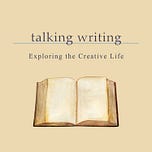Editor’s note: As with many things in my creative life, the idea for this pairing occurred by a coincidence that felt weird while it was happening. While preparing the podcast on climate change that we released last week, I was reading through the material and listening to John Atkinson’s music. With Alice Major’s excerpts, the decisions for which music to use was done in the editing program while listening to the poems and trying out different parts of John’s music. But with “Float,” I happened to start reading the short story around the same time as Long Harbor began playing, and the two pieces just seemed to complement each other perfectly.
This short story grew into JoeAnn Hart’s 2013 novel of the same name and predates it by a few years. It tells the story of a man struggling in his marriage and business while facing the effects of plastic waste in our water. John Atkinson’s Long Harbor is a sonic exploration of the history of the New York Harbor made from field recordings collected along its waterfront in 2021. It stands as a reimagining of its creation, from glacier meltwater to unbridled human pollution to the current attempt to find a sustainable equilibrium. The piece was made possible by Works on Water.
—John Vogel
God Help Us.
The words, writ large in the sand, appeared on the beach after Duncan Leland’s attention had already drifted. It was in the pink of the afternoon, at the end of another trying day, when he should have been attempting something spectacularly proactive to save his sinking business, such as scrambling numbers on a screen or gathering somber consultants around him, but instead, as was his habit, he was looking for answers outside his office window. The sky was clear and blue, the water calm. The serenity of the day mocked the economic storm raging around him. He was now, as Harvey Storer of Coastal Bank & Trust had so coldly pointed out to him that morning, officially underwater. He owed more on Seacrest’s Ocean Products of Maine, Ltd., than the business was worth.
“True that,” Duncan had agreed, “but only at this very moment.”
”What else is there?” asked Storer.
A leveling silence washed over Duncan as his mind slowly emptied of words. He was opening and shutting his mouth like a fish when Storer, sitting across from him at the loan desk, leaned in closer.
“Duncan? What else do you have that might secure this loan?”
Duncan shook himself out of his trance, realizing that Storer’s was a fiscal rather than a philosophical challenge. “It’s all here,” he said, half-standing as he slapped pages of the loan application down on the mahogany like tarot cards. “Look, in the spring, our new line of fertilizer hits the market, opening a revenue stream so robust it’ll be like drinking water from a firehose!” He displayed a spreadsheet thick with projections, but this banker, like the ones who came before him, remained unmoved. Duncan’s vision of rosy profits in the future failed to overcome the devalued assets of the present, and in that moment he saw his business begin to slide away.
He’d left Storer’s sterile cubicle in a funk and gone back to his office, back to the warm embrace of his chair and the tranquilizing effect of the harbor view. He fixed his gaze on the beach, a patch of rust-streaked sand so inhospitable it did not even exist at high tide, and let his mind fix on a plastic bag caught on a submerged stick. He watched the bag, alive with water, wash gently from side to side until his own currents of thought slowed to a listless tempo. After an empty space of time, the retreating tide abandoned both stick and bag to the land, and his hypnotic amusement was over. Looking back, he was sure of one thing. There had been no one on the beach and there had been no mysterious message written in the sand. That was two things, but still.
He wondered, sometimes, if he might have been a witness to the event if the music hadn’t ended. He liked to keep an iPod playing on the factory floor, on the theory that if he was asking his employees to spend their days cooking fish skeletons down to a fine powder, then he had better give them some background music to divert their senses. If nothing else, managing the sound system was one of the few enjoyable duties left to him, so when a cycle of early Beatles ended, he turned his back on the water view to deliberate at length between Playlist #8 (Miles, Coltrane, and Rufus Harley) and Playlist #22 (Dylan, Joni, and Steve Earle) before abandoning hope of coming to any decision at all. He clicked Shuffle in defeat and returned to his chair. When he looked back down at the beach, there, scratched into the sand, were the three-foot-high wobbly letters spelling out God Help Us. The surface was still reflective from its recent brush with water. The message faced the harbor, not him, so it didn’t appear to be a personal accusation, more like a random act of prayer. Or not. Worst case scenario, it was written by an employee petitioning God on behalf of Seacrest’s. But no matter who wrote it or what the intention was, it was a desperate message and a bad one for potential investors, should he ever have any. It had to go.
Down, down to the sea he climbed, taking the two iron flights of the fire escape to avoid his factory workers, who seemed to want so much from him these days, most of all an optimistic face on Seacrest’s future. Gone, gone, gone. It was low tide now, and his heels sank into the wet sand as he trudged toward the words, his footprints filling with water behind him. With the tip of his black rubber boot, he proceeded to rub out the message, erasing the d first, changing God Help Us to Go Help Us.
“Better,” he mumbled. More ecumenical, more in keeping with his Unitarian ancestry. Then he contemplated Us, that sweet plural pronoun of marriage. He rubbed it out. It was the middle of August when Cora asked for a little air, and here it was after Labor Day and he still hadn’t heard back from her whether she’d caught her breath. He stood very still, trying to quell the sour tide in his gut. How had the solid continent of Us become the scattered islands of him and her? They had just wanted what everyone else seemed to have. “Is a baby really too much to ask for?” as Cora would say. “They’re everywhere!”
He should have known that to have expectations was to court disappointment. Two years ago they’d decided it was time to add to their fund of general happiness, but nature had not taken its usual course in the bedroom. Was it her? Was it him? Or were they just a bad combination? But Cora, even-keeled as she was, wouldn’t let them go there. “No finger pointing,” she’d said, “let’s just get the problem solved,” and in July they began to take deliberate steps toward in vitro. At the very first appointment, he was asked for a sperm sample to test for volatility. He found the staff oddly humorless about the situation and his jokes fell flat, but he got the job done. Afterwards, it was he who fell flat. He froze in the hallway with the filled specimen cup in hand, locked in terror as if staring into a milky abyss. A nurse had to wrest the container from him, and from then on his marriage began to spiral down the drain.
The problem was this: Fertility treatment had led him to think about the dangers of replicating his family’s genes, and those worries began to bloom like algae in a stagnant pond. The next thing he knew he was debating whether it was right to bring children into the world at all, a world so overcrowded and polluted it sat on the brink of ecological extinction. This, in turn, led to questions about the meaning of life itself. “When we give them life, we give them death,” he said. “What’s the point?”
That was it for Cora. “Enough thinking,” she’d said through her tears, “it’s time to act.” Off to counseling they went, but they could not reach the line of salvage in that desolate terrain, with its boxes of tissues and anatomically correct dolls stored in a milk crate in the corner. Cora was particularly teary because she’d been getting estrogen shots in preparation for the egg harvest. Marriage counseling ended when he failed to follow through on scheduling an appointment, a chore the therapist insisted they take turns doing, a tactic which seemed like some kind of a test. He remembered the moment he stalled out. He had been, as was his habit, gazing out of his office window, watching the Hood Dairy blimp hover in the air above a distant beach. Enjoy Hood Ice Cream was printed on the rounded sides, sending him into a smiling reverie of dripping vanilla cones, sand buckets, and other childhood joys. “Enjoy it all,” he’d said out loud. He continued to watch until the blimp turned inland, but instead of majestically disappearing over the horizon as usual, it slowly—ever, ever so slowly—dipped too close to the treetops. The navigation bucket got stuck in the branches, and it could not move. Engine trouble, he’d found out later. No one was hurt, but how could he make an appointment after that?
“What kind of a world is this where a zeppelin can just fall out of the sky?” he said to Cora. It was the day when he’d gone to Portland to produce the specimen for the first attempt at implantation later that week, so he was particularly shook up. “How can we bring a child into a world that hasn’t even mastered 19th-century technology?”
Cora was as unmoved as the zeppelin. “Fuck the blimp,” she said. She was a family therapist herself, and as far as she was concerned, his inability to make the appointment demonstrated not just his lack of commitment to the process, but a lack of commitment to her and their future baby. Like a cruise ship, Cora was not easy to turn around once she was set on a particular heading. She started throwing ballast overboard. She sent Duncan away that very night. “Go to Slocum’s for a few days to get your head on straight. You’re too anxious to be around right now.”
Their relationship had been sitting in dead air ever since. But that was not today’s problem. His marriage would have to wait in a long line of tomorrow’s problems, because today he had to save his business. Seacrest’s was letting in water at every seam, and it was all his fault. He had aimed too high. He should have opted for the cheapest solution he could get away with two years ago when the EPA mandated the installation of pollution controls, but no, in the spirit of the careless prosperity of the times, he’d gone trolloping to where the woodbine twineth and borrowed too much money for a complete modernization of the plant, making it as clean and tight as a toolbox. The banks were crazy to loan him so much money. How much profit, really, could be had from fish waste? Seacrest’s, whose business was to process marine waste into feed and fertilizer, used to be known, along with all the other gurry or dehydration plants on the coast, as the smelly step-child of Maine’s fishing world. Now the renovated plant was almost odorless. The industry had come a long way since his great-great-grandfather Lucius Leland’s time, when gurry—the finny bones and entrails leftover from cleaning the day’s catch—was unceremoniously dumped into the harbor, only to wash up on shore later in the day. Lucius was originally from bustling New Bedford, but he dropped anchor in Port Ellery in the name of love for a local lass and soon saw wealth where others saw garbage. Using the money he’d raised touring the Midwest with a sawdust-stuffed whale in a boxcar, he built a factory to dry and grind up the fish scraps for livestock feed. The first thing he processed was his whale. The pet food industry soon became a major buyer as well, and business boomed for over a century, but in the last few decades they’d had to branch out just to keep up. His father developed their unique fish fertilizer, and more recently Duncan had added kelp to the recipe after watching Cora gather seaweed from the beach for her garden.
Kelp. He looked at Go Help, then changed the H in Help to a K and added an exclamation point.
“Go Kelp!” he shouted and then looked around, but there was no one to hear. Not even the gang of seagulls patrolling the water’s edge had paused to consider his outburst. As was too often the case these days, his words only made sense to him. Go Kelp! could be the name of his new retail line of soil amendments, if there was a future for them at all. Before the expensive renovations to the building, he’d always sold his fertilizer in barrels to companies who resold the powder in small bags under their own pricey labels, but as the bills came flooding in, some daft accountant said that the only way to recoup his capital expenditure was to leave the safe harbor of wholesale and set out into the deep waters of retail. Which meant more money out the door. His marketing investment had been huge, and the product was still not launched. Worse, competition was darkening the sky. A dehyde down in Massachusetts had contracted with key fish processors for their waste and was already selling eco-sludge directly to the planting public. Another company in northern Maine was peddling lobster shell dust and getting as much play in the gardening magazines as a dazzling new rose. He hadn’t acted fast enough in making the transition. The words he’d overheard in a bar 10 years ago, soon after he took his father’s place at Seacrest’s, came back to him now: “Duncan Leland run a business? He couldn’t run a bath.”
One of the seagulls bounced closer with an eye toward a blue shell near his foot.
Duncan kicked the mussel to the bird so it could see for itself that it was empty, then with a start, he realized that there were no footprints on the beach other than his. How was that possible? Someone wrote the words without walking on the sand? He looked around, then up. He was lost in troubled thought when a ship’s horn sounded, frightening the seagulls into the air with hysterical shrieks and a slow flapping of wings.
All but one. There was always one.
The large black-backed gull had a loop of a six-pack holder stuck in its beak and around its neck, so that the sharp plastic dug into the sides of its face. The rest of the holder was bunched up around its head, and two of the loops formed glasses through which the bird stared at him with red burning eyes. One wing hung limply by its side, dragging in the sand. The poor bastard could hardly move without making things worse, and Duncan knew that feeling all too well. The kindest thing to do was to let nature take its course, but when the bird opened its beak in mute appeal, Duncan realized he was screwed. He’d have to give it a fighting chance or never face his friend Josefa Gould again. Josefa ran Seagull Rescue out of her backyard, a cramped space where the birds went to linger in pain before dying. He looked up at the factory. He couldn’t see anyone at the windows because of the harsh reflection of the sun. But even though he couldn’t see his employees, he could feel their eyes upon him, and in his mind he heard them laughing.
Let them. Wounded animals had to stick together.
He held his arms out, fluttering his hands, and as he edged slowly toward the injured gull, he felt himself to be the ridiculous figure his employees thought he was. He could hear Cora telling him in the measured cadence of her profession that he was being paranoid, that he had the love and respect of all his employees. But this was not paranoia; how he wished it were. Ever since his father died, forcing Duncan to move back from New York to take over Seacrest’s helm—his older brother Nod having laughed it off—he felt he was not meeting the employees’ expectations of a Leland boss. Duncan had arrived at the tail end of a long line of rugged, blond male specimens who were athletic, competent, and self-assured on land and sea. He was none of those things. Baby pictures showed him as a happy towhead, but the years had darkened his hair along with his mood, until now both were mud-colored. Behind his back, he imagined that his workers made fun of his coordination (faulty) and glasses (eyes too dry for contacts). He was tall, yes, but tall in a gangly, loose-limbed sort of way. His image was not helped by the fact that at the moment he wore a business suit tucked into calf-high muck boots. After he’d returned from the bank with an empty begging bowl, he was too tired to change into his work clothes of jeans and sweatshirt. He’d removed his tie and tossed it up and over the ceiling fan like a noose, then slipped off his leather shoes and put on the wellies he kept in his office for slogging around the factory floor, but he’d done nothing to protect his navy Brooks Brothers outfit. What did it matter? He saw no future that included a three-piece suit.
Taking care not to slip on the amber blobs of jellyfish that had been stranded by the tide, Duncan feigned left, and the bird bobbed right; back and forth they went, tangoing their way slowly to the crumbling seawall where the gull could be cornered among the debris. If the harbor of Port Ellery, Maine, was anatomical, they now stood firmly in the appendix. The town, all red-brick and shadows, was neatly centered in the groin between two intertwining estuaries that flowed into the harbor like crossed legs. Protected coves formed armpits and piney islands spread across the skin of water like raised hives. Seacrest’s sat off the harbor’s irregular belly, in a small, unnavigable loop prone to collecting trash. Blue rubber gloves and pieces of yellow rope were dashed twice daily against the seawall and then fell behind the dark wet rocks. Twisted metal shrines of lobster traps had dug into the beach to become part of the natural landscape, but plastic water bottles and featherweight polystyrene coffee cups were the transient and windblown accessories. Some days the tide took it all away; other days it left it all behind.
The gull’s options narrowed, and it turned its back to the wall, preparing to hold its ground. Duncan removed his jacket and held it aside like a toreador. The air blowing in off the harbor was cool, but the warmth of the sun on his back reminded him it was still technically summer. “It’s not over yet,” he said to the bird and moved carefully toward it, attempting a graceful drop of the jacket, but that required him to get so close that the gull was able to slash the tender part of his palm with the curved tip of his beak before trundling away.
“Damn!” Duncan squeezed his hand and looked up at the factory. He was sure he saw people move away. Would no one come and help him? Worse, would someone come to help and expose him as a leader who could not even catch an injured gull? It was equally unthinkable that they should see him walk away from a bad situation. He had to hurry. He took hold of his jacket and, with what he considered to be a superb show of agility, pounced on the bird. There ensued a whirr of elbows and wings, and for a moment Duncan thought he’d lost him, but finally, kneeling in the wet sand with sea water seeping through the wool blend of his trousers, he managed to wrap the jacket over the bird’s head. Darkness calmed it down while Duncan restrained its wings with the sleeves. He was breathing hard by the time he collapsed against a barnacled rock with the neat package of gull under his arm. “For a dying bird you’ve got a lot of fight left in you,” he said. He readjusted his glasses, then dug around in his pants pocket for his cell phone.
“Josefa, I’m on Seacrest’s beach with a gull for you—bring a cage and a Band-Aid.”
Acknowledgements
Bear Deluxe Magazine, #31, Winter 2010–2011.
Winner of the Doug Fir Fiction Award, Orlo.org.
This short story evolved into the novel Float, published in 2013 by Ashland Creek Press.
Episode Information
Highwire Act and Other Tales of Survival by JoeAnn Hart (Black Lawrence Press, 2023).
Long Harbor by John Atkinson (self-released, 2022).
Photo credit: “Ode to a Plastic Bag” © KellyB; Creative Commons license.














